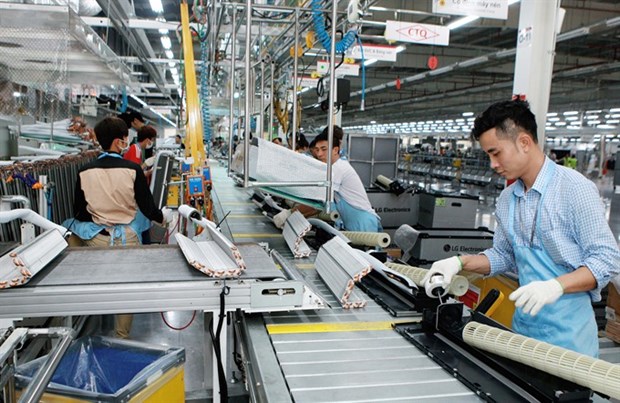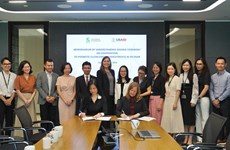Tax, investment changes concern foreign firms
 A production line of household appliances at a factory of LG Electronics Vietnam in the northern city of Hai Phong (Source: VNA)
A production line of household appliances at a factory of LG Electronics Vietnam in the northern city of Hai Phong (Source: VNA)
Hanoi (VNS/VNA) - The changes in tax
policy and investment incentives are the issues of greatest concern for foreign
investors in Vietnam, said Bui Ngoc Tuan, Deputy General Director of the Audit
and Advisory firm Deloitte Vietnam at a workshop on in Hanoi on July 10.
Themed “Investment incentives, related party
transactions: situation and solutions,” the workshop was co-organised by
Deloitte Vietnam, the Ministry of Planning and Investment and the Ministry of
Finance.
“The factors impacting foreign direct investment
activities often include the fluctuation of the tax rate through the years,
available incentives in the country, flexibility in the application of
incentive schemes, time for investment procedure and advantages and
disadvantages of administrative investment procedures,” Tuan said.
The Vietnamese Government continues to make
policy adjustments toward a flexible and transparent orientation to create the
most favourable conditions for foreign investors to enhance their national
competitiveness, Tuan said.
The tax system reform strategy for the 2011-2020
period has brought achievements, said Nguyen Thu Thuy, a representative from the
Taxation Policy Department under the Ministry of Finance.
Under the reform, tax policies create a fair and
equitable environment without discrimination between different economic
sectors, forms of ownership and taxpayers.
However, Thuy said, many foreign-invested
enterprises (FIEs) are taking advantage of strong investment incentives, such
as land rent, Corporate Income Tax (CIT) and Personal Income Tax (PIT), to
transfer prices and profits.
An analysis of financial statements of FIEs from
2012 to 2016 shows that the number of FIEs reporting losses is between 44 percent
and 51 percent.
At the same time, the increase in scale of
investment and business activities from these FIEs reporting losses is higher
than the increase in the number of FIEs reporting losses, which shows that the
problem of transfer price in the FDI sector is increasing and becoming more
complex, Thuy said.
Besides the price transferring activities of
FIEs from Vietnam to abroad, there are also cases of the backward transfer of
profits (from abroad to Vietnam) of some large FIEs enjoying high incentives in
CIT rates and CIT exemptions and reduction periods.
“This is shown by the data that the average
return on equity (ROE) of FIEs in some sectors over the years has always
remained very high, such as electrical components computer, peripherals,
telecommunications and software, with ROE before tax more than 30 percent,” she
said.
There should be a control mechanism to limit the
FIEs reporting losses or losses in capital that still continue to invest in
expanding operations in order to enjoy incentive tax, Thuy added.
Transfer pricing is an integral part of global
trade, hence it cannot be avoided, said Thomas McClelland, General Director of
Deloitte Vietnam.
“Transfer pricing is not only about margins and
benchmarking analysis, it also requires business performance assessments,” McClelland
said.
He added that tax authorities need to understand
the business realities and then take an appropriate course of action. They also
need to enforce basic compliance first rather than cherry picking taxpayers for
audit.
The national legal system needs to be
internationalised in order to promptly catch up with international trends. For
example, more bilateral treaties should be signed, he said.
“If Vietnam currently does not have mechanisms
in place to measure the impact of their incentives, it is strongly advisable
that a monitoring and evaluation system (M&E) be implemented,” said Wim
Douw, a senior expert for trade and competitiveness policy at the World Bank.
Such a system should be based on clearly defined
policy objectives and would track the performance of both the costs and
benefits of the incentives offered.-VNS/VNA













